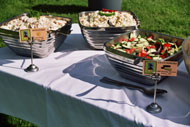| Food for Thought: A Local Food Initiative |
| Food for Thought is an initiative to build a sustainable local market for foods produced in and around Knox County, Ohio. Directed by the Rural Life Center at Kenyon College, this collaborative effort is developing a countywide food system to enable area farmers to market their products to individual consumers and institutional buyers including schools, hospitals,
restaurants, grocery stores, and caterers.
|

Locally produced honey is one of many products available in Knox County.
|
Food for Thought
benefits our community by:
- offering farmers a stable and profitable market for their products
- providing consumers with healthy, tasty, and nutritious food
- educating the public about their food choices, farming, and local rural lif
- keeping more of the $130 million in annual food purchases within our county
- supporting independent businesses
- maintaining greenspace and rural character by sustaining family farms
Food for Thought facilitates the institutional purchase of local foods by:
- bringing together farmers, institutional buyers, and agricultural experts
- addressing issues including supply, processing, distribution, and quality control
- assisting farmers in tailoring their products to meet local market demand
- conducting continuing research on the local food system
- developing promotional materials to advertise local products
- preparing educational materials and public programs to raise consumer consciousness
|

Knox County farmers operate nearly 1,300 farms comprising some 206,000 acres of land. |
|
| Background |

Agriculture defines much of the Knox County landscape.
|
Food for Thought builds on a decade of activity designed to strengthen the connections between the farm and nonfarm populations of our community.The Rural Life Center’s Family Farm Project (1994–1997) stimulated a broad public discussion about the significance of agriculture in community life.The growth of |
large-scale corporate agriculture and the recent rapid expansion of metropolitan Columbus have placed considerable stress on area farms, an increasing number of which are targets for purchase by developers.

Residential development increasingly encroaches upon agricultural land, threatening the county’s rural character. |
Knox County’s response to this alarming trend has been a long-range effort to control and direct development in ways that protect farmland and rural character. As part of this effort, the current Knox County Comprehensive Plan calls for enhancing family farms’ sustainability by creating a dependable local market for foods produced in the area. |
|
|
| Organization |
| The Local Food Council, comprised of farmers, food distributors, institutional buyers, and agricultural experts, provides overall coordination of the project. Bringing together individuals representing all aspects of the food system enables us to address practical challenges and to sustain an ongoing dialogue about the future of food in our community. |
| Initiatives |

Mount Vernon’s farmers market has drawn residents back to the historic downtown.
|
Much of our work focuses on making locally produced foods available to individual consumers. We began in 2000 with the publication of HomeGrown: A Guide to Local Food Products in Knox County, Ohio. Creation of the Market on the Square, a farmer’s market located in the county seat of Mount Vernon, followed in 2001.Plans are underway to convert a historic warehouse in downtown Mount Vernon |
into a year-round venue for the sale of local foods; the facility will also house a community kitchen for the creation of value-added products.
| Food for Thought is also working with institutional buyers interested in local food purchases. Kenyon College began buying local foods as part of its campus dining service in 2004, and its new dining facility is expressly designed to expand this effort. Several businesses in Gambier now include local foods in their operations. |

Kenyon College’s dining service regularly features locally produced foods. |
faculty throughout the college currently offer courses on food, farming, and community life; students also participate through independent studies, farm internships, and extracurricular activities.
Taken together, the initiatives comprising Food for Thought constitute a comprehensive model for building a sustainable local food system that has received national attention. In June 2005, Kenyon hosted a national conference, “Putting Local Food on the Table,” which explored farm-to-table projects across the country. The project has also attracted significant regional and national media coverage.
If you are interested in learning more about Food for Thought, please contact Howard Sacks, director of the Rural Life Center, at 740-427-5850 or email rurallife@kenyon.edu.
|
|
